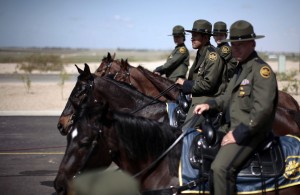 For individuals interested in pursuing a personally satisfying and professionally rewarding career in law enforcement, one questions that might come up is whether or not he or she will need a college degree to work for border patrol. With opportunities to travel while protecting and serving at a federal level, U.S. border patrol positions can give future law enforcement professionals with the right qualifications an interesting and gratifying career option.
For individuals interested in pursuing a personally satisfying and professionally rewarding career in law enforcement, one questions that might come up is whether or not he or she will need a college degree to work for border patrol. With opportunities to travel while protecting and serving at a federal level, U.S. border patrol positions can give future law enforcement professionals with the right qualifications an interesting and gratifying career option.
The Role of the Border Patrol Agent
Border patrol agents in the United States fulfill a vital part of the safety and security of the country’s citizens by enforcing law and order around the borders of the nation. Whether working to identify unlawful entry into the United States, combatting drug and other types of illegal smuggling, or preventing potential terrorist threats to the country’s citizens, border patrol agents must be highly qualified and trained in order to effectively serve the as part of the U.S. Customs and Border Protection department of the U.S. Department of Homeland Security.
Border patrol agents might work along land borders with Mexico and Canada, overseeing the importing and exporting of goods as well as monitoring the legal and illegal crossing of people into and out of the country. Additionally, agents might work in airports, docks, and other points of entry into the United States. Some agents will also be responsible for patrolling interior areas of the country around the borders to identify and monitor suspicious and potentially illegal actions related to border patrol.
Education and Training to Prepare
A college degree is not a set requirement for entering into a career as a border patrol agent, although having an education in a field related to the position, such as criminal justice, is often a benefit. Some courses a criminal justice student might complete that are beneficial include criminology fundamentals, police organization, criminal due process, forensic investigative procedures, introduction to criminal investigation, and criminal law. The ability to speak Spanish is also often required.
In addition to possible benefits from completing an associate’s degree or a bachelor’s degree in criminal justice or a related field, once hired, future border patrol agents will also be required to complete an academy for training. In addition to physical training and conditioning, future border patrol agents must also demonstrate knowledge of various laws for immigration and nationality, as well as marksmanship and possible instruction in foreign languages.
Additional Qualifications to Become a Border Patrol Agent
There are a number of additional requirements that a candidate must meet in order to be considered for employment as a border patrol agent. Most candidates will need to be under the age of 37. Additionally, potential hires should be a U.S. citizen, be a resident of the U.S., have a valid driver’s license, and pass a series of background, fitness, and polygraph tests. Additional information on the U.S. Customs and Border Protection qualifications and purpose can be found on their website.
Related Resource: Toxicologist
As a part of the system of protection of the United States government, border patrol agents must be qualified and prepared to ensure the safety and security of the country. Although not necessary, many future agents will need a college degree to work for border patrol and prepare for the process.